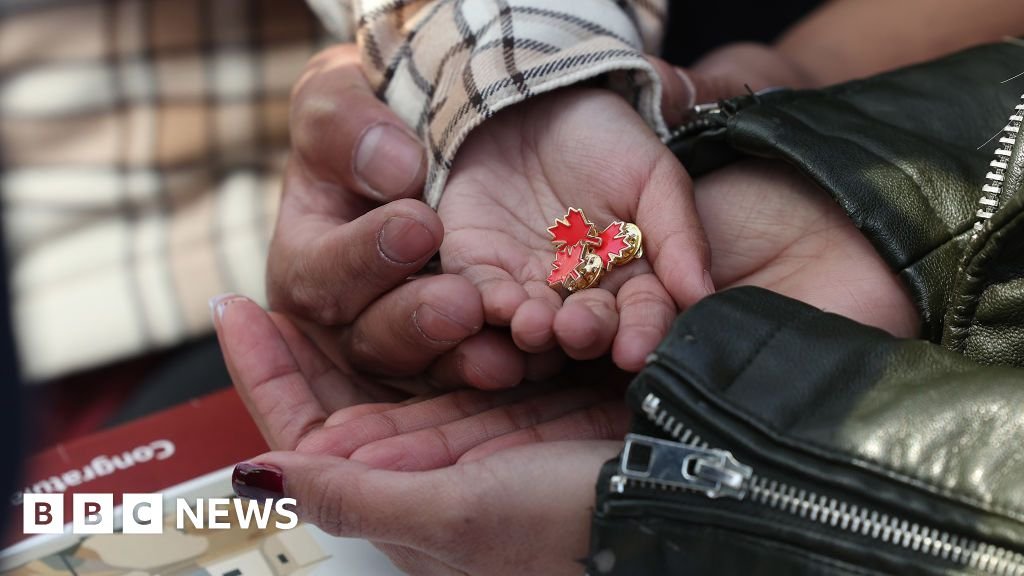For decades, Canada has positioned itself as a country open to newcomers, with an immigration policy aimed at growing its population, filling labor gaps, and settling refugees fleeing conflict from around the world. Ta.
But in recent months, Prime Minister Justin Trudeau intends to sharply reduce the number of immigrants allowed in Canada amid growing public concerns about the lack of social services, high costs of living and affordability of housing. said.
This is a big change for the country and for Prime Minister Trudeau, who ran for office in 2015 on a platform of embracing multiculturalism as an important part of Canada's identity.
His government has relied on ambitious immigration targets to spur economic growth.
In the face of criticism and plummeting approval ratings, the prime minister now says the government miscalculated and that Canada needs to “stabilize” population growth so it can maintain public infrastructure.
On Thursday, Prime Minister Trudeau and Immigration Minister Mark Miller laid out the harshest immigration cuts to date, cutting the number of permanent residents admitted to the country by 21% in 2025.
The announcement follows other cuts to Canada’s temporary resident programs, including temporary foreign workers and international students.
Prime Minister Trudeau explained the policy shift and asserted that “Canadians are rightly proud of our immigration system.”
“It has made our economy the envy of the world,” he said. “That's how we build strong, diverse communities.”
But Trudeau said the government “didn’t quite get the balance right” when admitting record numbers of temporary residents to ease labor shortages in the wake of the COVID-19 pandemic. He acknowledged that Canada’s immigration system now needs to be “stabilized.” .
His announcement comes as public support for immigration in Canada is declining.
A September poll by the Environics Institute, which has tracked Canadians’ attitudes toward immigration since 1977, found that for the first time in a quarter of a century, a majority of Canadians say there are too many immigrants.
The institute said this change in attitude was primarily driven by concerns about limited housing. But the economy, overpopulation and the way the immigration system was managed were also cited as major factors.
Abacus Data pollster David Collette said in an October newsletter that the idea that the “consensus on immigration is crumbling” is an understatement.
“I think that consensus has broken down, and I expect it to be one of the most salient issues in federal and local politics next year.”
Canada has largely welcomed immigrants. Data shows the country is a world leader in refugee resettlement, and the country has built a reputation over the past 50 years as a country that values newcomers.
The Canada Multiculturalism Act, passed in 1988, recognizes diversity as an integral part of Canada’s identity. Its multicultural heritage is also protected by the constitution.
“Since the late 1990s or so, Canadian attitudes have been broadly pro-immigration,” Michael Donnelly, a political science professor at the University of Toronto, told the BBC.
A 2019 Pew Research report showed that Canada has the most positive views on immigration among the top 10 destination countries.
Professor Donnelly said Canada’s electorate is largely made up of immigrants, which prevents major political parties from taking anti-immigrant positions.
Canada also rarely faces the kind of trouble from uncontrolled immigration experienced in other countries, an advantage of its geography surrounded by three oceans and the United States to the south, and Canada’s immigration system is open. It was seen by the public as being well regulated.
But Professor Donnelly says this positive sentiment has changed in recent years.
One reason for this is the unprecedented surge in temporary residents coming to Canada.
According to the Canadian International Education Agency, the number of international students increased by nearly 30% from 2022 to 2023. Meanwhile, the number of temporary foreign workers in Canada has doubled in the past five years, according to government data.
Another factor, Donnelly said, is the growing recognition that Canada’s immigration system has lost its integrity, due in part to miscalculations by the Canadian government.
After Canada lifted visa requirements for tourists from Mexico in 2016, asylum applications soared, forcing Canada to reimpose visa restrictions earlier this year.
Canadian media have also reported that some international students are using temporary visas to apply for permanent asylum in the country, a trend Miller called “alarming.”
Professor Donnelly said these and other incidents “lead people to believe that the government has lost control of migration flows”.
All of these concerns are underscored by the housing crisis affecting Canadians across the country, where a lack of available housing is driving up both rents and home prices for many, he said. added.
“People will see a huge influx of (new entrants) and a housing shortage and conclude that that is the direct cause,” he said.
Professor Donnelly points out that while there is some racist discourse surrounding immigration in Canada, the change in Canadian attitudes is not primarily driven by sentiments seen in European countries or neighboring the United States. did.
Rather, it is driven by people’s desire to govern Canada’s immigration system.
“The Trudeau government is clearly trying to give the impression that ‘we have this under control,'” Professor Donnelly said.

